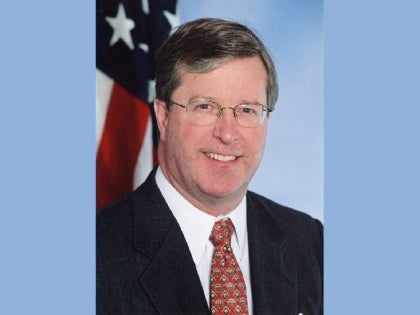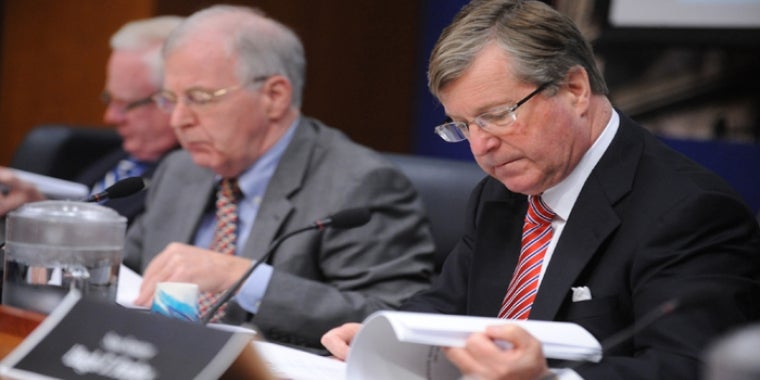
Medicaid Fraud Task Force Issues Recommendations
George Winner
March 17, 2010
-
ISSUE:
- Medicaid

Albany, N.Y., March 17 – State Senator George Winner (R-C-I, Elmira) and the members of the Senate Republican Task Force on Medicaid Fraud released today an initial report and a series of recommendations for improving the state’s efforts to combat abuse, fraud, and overutilization in New York’s $52-billion system of Medicaid.
The task force believes that its initial recommendations point to annual savings of approximately $500 million and should be included in the 2010-2011 state budget.
Watch video of today's news conference.
Winner, ranking Republican member on the Senate Investigations Committee, also participated throughout the day today in an Investigations Committee hearing to further examine and question representatives of the state’s Office of Medicaid Inspector General (OMIG) and other state officials currently responsible for Medicaid oversight.
“Medicaid costs a billion dollars a week in New York. It’s gobbling up taxpayer dollars and local resources in alarming and unsustainable ways,” Winner said. “Why can’t we put a stop to the fraud, overutilization, and waste that costs taxpayers hundreds of millions, if not billions of dollars? We need a ‘zero tolerance’ policy, and we need it now.”
Winner, a long-time Medicaid reform advocate, said that the new task force has been charged with developing recommendations for action in this year’s state budget to combat what some fiscal watchdogs believe could potentially be billions of taxpayer dollars being lost to abuse, fraud, and waste.
In addition to its internal examinations, the task force has also received testimony from district attorneys at the forefront of prosecuting Medicaid fraud, representatives of cutting-edge corporations in the field of Medicaid oversight, and county executives who have been widely recognized for their efforts to improve the system.
In developing its recommendations, Winner said that the Task Force on Medicaid Fraud benefitted from the efforts of Chemung County Executive Tom Santulli and representatives of the Horseheads-based Salient Corporation. Santulli, who’s also currently president of the New York State Association of Counties, and Salient chief executive Guy Amisano testified at a recent task force hearing.
“I’m incredibly proud to be able to showcase two hometown leaders who have pointed out many ways to make Medicaid more accountable, efficient, and innovative,” said Winner. “There’s no question that Chemung County Executive Tom Santulli and the Salient Corporation know how to cut Medicaid waste and make the program work better, and the task force recommendations reflect their experience and expertise.”
Salient has developed computer software, already being used in Chemung and nearly a dozen other counties statewide, that some officials believe could point the way to hundreds of millions of dollars in Medicaid fraud and waste prevention at the state level.
Based upon Amisano’s testimony, the GOP task force learned that ensuring the proper dispensation of generic drugs when a physician does not specify a brand name drug is one action alone that would save approximately $300 million.
Despite the fact that they are on the front lines of implementing the Medicaid program, Santulli and other county officials also testified that the state inhibits their efforts to stop fraud at the local level. In fact, the 2009-10 state budget enacted by Governor David Paterson and the Democratic leaders of the Legislature last April eliminated the eligibility requirements for face-to-face interviews, finger-imaging and asset tests for applicants for Medicaid that are conducted by counties. The interviews are intended to ensure accountability in the system, but will no longer be required beginning this April.
Winner said that the task force is recommending the reinstatement of the asset-and-resource test for Medicaid eligibility determinations and to include the local Department of Social Services Fraud Unit as part of the application process.
As a result the initial recommendations released today will empower localities to boost their own fraud-detection efforts, and more aggressively target waste and overutilization of services. Specific recommendations include:
-- authorizing the referral of all fraud cases to local district attorneys in order to reduce the timeframe for prosecuting cases while permitting counties to keep a portion of all fraud recoveries;
-- allowing counties to access the State Medicaid Data warehouse to improve local efforts to uncover billing patterns that point to possible fraud or overutilization of services; and
-- creating an automated system to alert county officials when residents become incarcerated and, consequently, ineligible for Medicaid benefits.
Overall the task force report, “Combating Medicaid Fraud in New York State,” paints a chilling picture of a state system of Medicaid rife with abuse. One in five New Yorkers are currently enrolled in Medicaid, a number that’s projected to increase to one in four by 2012.
Winner said that the urgency of the state’s fiscal crisis demands a renewed focus on the fraud that has plagued the Medicaid system for years. In his proposed 2010-2011 state budget, New York Governor David Paterson increased the state’s target for Medicaid fraud recovery by $300 million, which Winner said isn’t nearly enough.
As late as last December, for example, the state comptroller’s office released audits showing nearly $100 million in Medicaid overpayments, billing errors, and other problems. A report issued earlier this year by the U.S. Department of Health and Human Services ranked New York 26th in the nation in Medicaid fraud recovery. According to the report, states such as Missouri and North Carolina recover about three times as much in Medicaid fraud, while six other states recover twice as much as New York.
-30-
See full copy of task force report below:
Share this Article or Press Release
Newsroom
Go to NewsroomAccess to State and Local Government
December 29, 2010

Some Final Thoughts
December 27, 2010

Restore Voice of Rural New York
December 13, 2010

What About Economic Growth?
December 7, 2010
